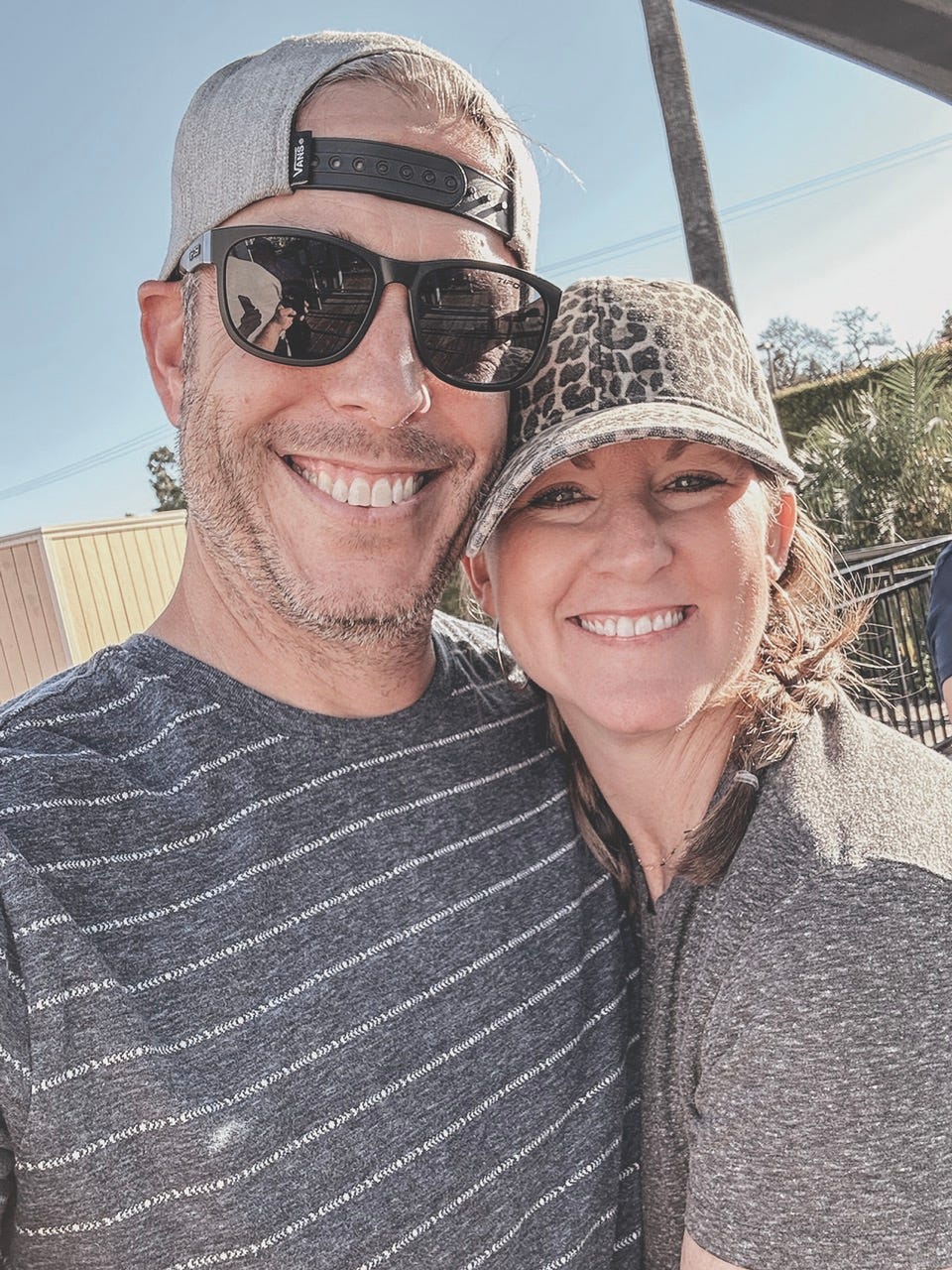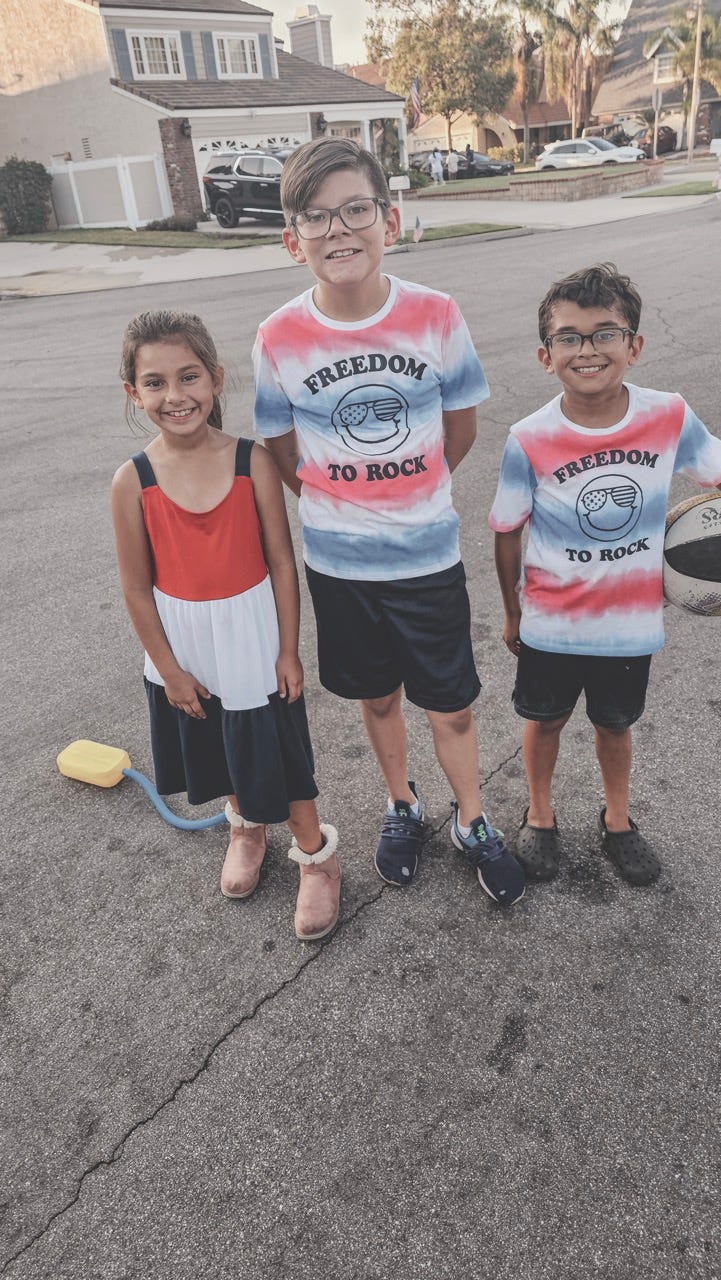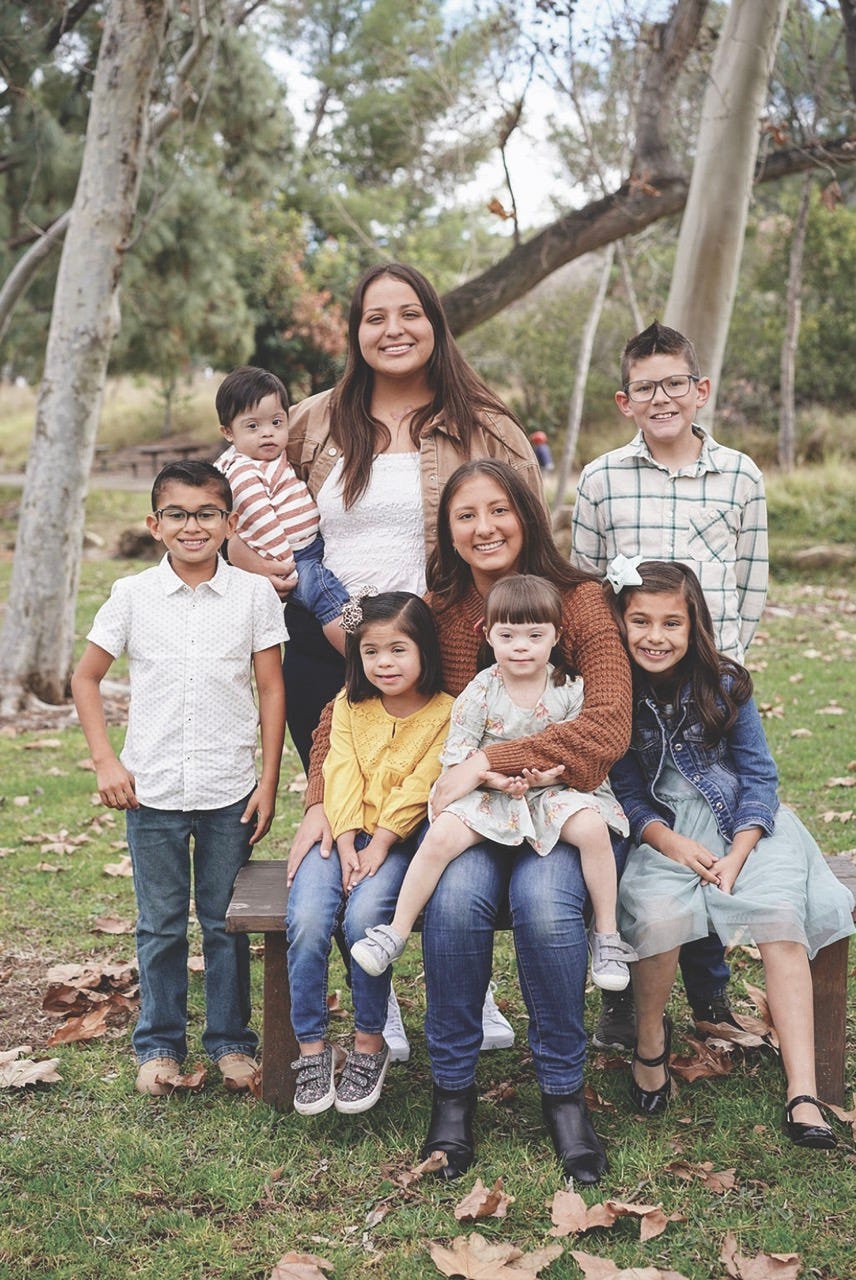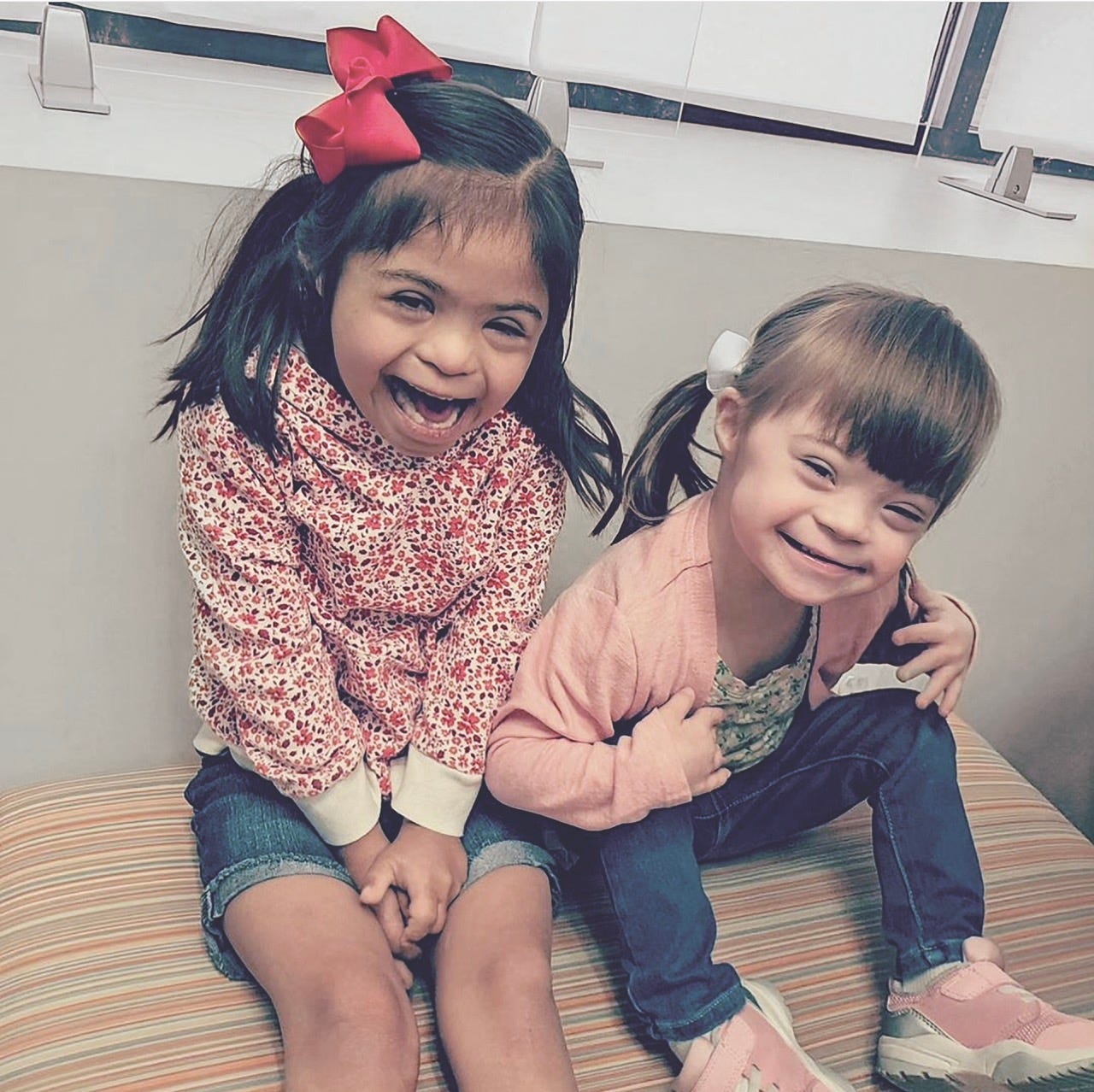Why Not Us?
A Story of Unconditional Love through Foster Care and Adoption
Words by Sabrina Schlabach
In the United States, babies who have a prenatal diagnosis of Down syndrome are aborted 94% of the time. The number of families who go through counseling when they receive that prenatal diagnosis, are among the highest ranges of those who still choose to abort. Adoption rates have dropped 60% since 2022. Why? Because there’s just not as many children to place.1
Thoughts on abortion, foster care, adoption, and special needs have been divisive for many years, and it’s only gotten worse. I’m not here to debate the issues or share my opinion about decisions that people have made or not made. I am here to share how these heart-breaking and staggering statistics factored into one family’s journey. A journey of love, faith, and acceptance.
High school sweethearts, AJ and Katie Shappi, have eight children. All are adopted. The oldest six were adopted from foster care. The youngest three have Down syndrome. One child has Fetal Alcohol Syndrome, and another—his biological sister—was born addicted to drugs (to which, thankfully, there’s very little residual effects). Katie shared, “People often ask us if this was always the plan. And, no, it wasn’t. Not because we thought one way or another about adoption, we just didn’t think about it.” But God kept bringing children into their lives.
The Shappis oldest two daughters came to them by way of a woman they knew from church for many years. Through a challenging and lengthy process of legal guardianship to adoption, AJ and Katie finally became the girls’ parents. It was through this process that they really learned more about the foster care and adoption system and how great the need is for foster parents. “I call it ‘Mothering in the Middle’,” said Katie. “There is short term care, long term care, and emergency shelter care—which is 30 days or less. All aspects are needed.” The Shappis stepped up, telling their foster care agency that they would help wherever there was a need.
The original plan was simply to foster children, but their journey led them farther. “It wasn't about wanting 'x' number of kids,” shared Katie. “It was about being available for whatever the need was. And, obviously, some kids stayed.”
As Aj and Katie adopted children into their family, they began to take notice of other families who were adopting, many of whom chose children with Down syndrome. This expanded their viewpoint as they saw a deep need for people willing to adopt children with special needs, and they began looking into the possibility. “We never want to see a child aborted—for any reason,” said Katie. “We believe in the sanctity of life and want to be a voice for the voiceless, especially those who are more likely to be aborted.” This passion led them to ask their county government if they could be put on the list to adopt a child with Down Syndrome. It took five years, but they were finally connected with Lucy.
After they adopted (now 7-year-old) Lucy—the couple's sixth adoption—AJ and Katie were no longer eligible to foster according to the rules in the state of California. And things were changing. They began to see a shift in how many people were allowed to adopt children directly from foster care. More and more children were being placed with relatives instead.
Life with Lucy in their family was rewarding, and even though she had many medical issues, AJ and Katie learned a lot. They learned how to navigate all the doctor and hospital visits. They discovered how well they work as a team. And most of all, they desired to help these children who need “a little more.” Thus, the Shappis sought out more children with Down syndrome to adopt. Soon, Nora was added to the family. After some time, they decided to reapply and go back onto the waiting list for another little one with Down syndrome who needed a home.
AJ and Katie were at one time matched with a newborn, but the parents decided to keep their baby girl after all. One could imagine that they were disappointed—but to the contrary, Katie shared, “We believe that if you can raise your own children, you should. If it took that matching process for the parents to realize that they could do this, then that’s great.” Of course, there will be things to deal with, and it won’t always be easy, but that is a part of the deep love and bond that comes with parenting. And when you have a child with special needs, it’s vital to find other similar families to do life with.
Since they hadn’t finalized that adoption, the Shappis were still on the waiting list. On February 10, 2023, Katie received an email from Stephanie with the National Down Syndrome Adoption Network (NDSAN), giving them a few details about Josiah, a 9-month-old little boy from California who needed a home. “It was a unique case,” shared Katie, “in the sense that he was already 9 months. Most families are looking for a newborn, but we were actually wanting an older child, because… well, we like our sleep!” AJ and Katie, along with sixteen other families, submitted their profiles for review. Because the birth mom preferred her son go to a family in California, that narrowed it down to the Shappis and one other family.
Two short days later, during the Superbowl, Stephanie called to say, “Congratulations! You’ve been matched.” After talking through a few details, AJ and Katie began to get everything in order, and on Tuesday they were on their way to go pick up their newest child, Josiah (whose name means God protects). “We literally had four days’ notice,” said Katie. “It was a definite whirlwind!”
Another interesting factor to Josiah’s adoption, is that the mother wanted to have an open adoption. Choosing to adopt a child is only one half of the decision. Someone must first make the choice to place that child up for adoption, and then, to the best of their ability, choose a family for their little one. The people on both sides of that decision need the love and support of people around them. With the honor of being chosen to care for Josiah, the Shappis are glad they have the opportunity to also care for, support, and minister to this extremely young woman who had to make a difficult choice.
As I’m sure you can imagine, having eight children—seven of which are in school—makes for a busy schedule. In order to have a bit of quiet time to start their day, AJ and Katie get up between 4:30 and 5:00am. The children start waking up around 6:15am, and everyone is off to school by 7:30am. This leaves Katie to take Josiah to his appointments, get groceries, pick up prescriptions, clean, do laundry, cook, and whatever else pops into the day. “And,” said Katie, “it’s also really nice that AJ works remotely, so if I need an extra set of hands, he’s here to help.”
While the Shappis very much enjoy being in the outdoors and staying active, they also don’t push their children into many extra-curricular activities. If there is a sport or something that one is interested in, they give it a try, but overall, they prioritize church and family. “We enjoy going to the beach, camping, and just being out and about. We’ll often take a walk around the area after dinner, but overall, we’re pretty low-key,” shared AJ.
The Shappis shared how vital it is to have a good support system. They are blessed to each have a parent who lives nearby, their church family has been very helpful in coming alongside them, and AJ and Katie are also part of a Down syndrome support group in Orange County. The couple is very thankful for the Special Education program in their school district, too. Katie shared, “The district is amazing in helping, encouraging, and working with kids with special needs. They know our hearts and why we do what we do. We’ve never felt like we had to ‘fight’ for anything we feel our kids aren’t getting.” AJ agreed, stating, “We definitely feel supported.”
AJ and Katie don’t have specific plans to adopt any more children at this time, though they haven’t ruled out fostering again, once the kids are older. They’re in a unique niche because of all they’ve walked through. Their experience has taught them a lot. Right now, their focus has shifted to educating people about the realities of abortion, foster care, adoption, and Down syndrome. Much of this is done through the support of a local pregnancy center. If even one child is saved, the effort is not wasted.
We all know that choosing to adopt isn’t something to take lightly. It comes with many conversations and considerations. It’s important to talk with your spouse, any children you already have (if old enough), others who have adopted, family members, and perhaps, professionals and your pastor, too. When couples interested in adoption come to the Shappis for advice, they have a few questions and thoughts for these couples to mull over and work through together.
Both husband and wife need to be on the
same page.
Talk through what your hope and expectation is: domestic/international adoption, health, age, etc. Don’t be super narrow. No adopted child is going to meet any narrow parameter that’s set.
Are you committing to this child for life? Especially with children who have special needs, you’ll never be empty nesters. Are you okay with that?
When you adopt—or foster—it can feel scary because you don’t know what issues those children could have. But realistically, any child who’s adopted is going to have baggage. There’s something called the Primal Wound, which means that kids who are adopted—no matter the age or if it’s a private adoption—have a primal wound of abandonment. It has to be something you’re willing to walk through with them. (Sometimes it can be easier if the child has special needs because they may not understand that you’re not the biological parent.)
As much as adopting is worth it, there are going to be times when you need to talk about things that are difficult, uncomfortable, or sad. Are you ready to do that?
We strongly believe that the child should know they are adopted. There’s a lot of studies that have been done on children who don’t find out until later or even into adulthood that they’ve been adopted, and the results are never good. Be up front
and honest.
It’s 100% worth it. Always, always, always.
If someone is unsure about adopting a child with special needs, remember this: they are not a mistake. This isn’t a surprise to our Lord. Their life has worth and value and they can positively impact society. “We wish everyone believed that about our kids,” said Katie. “Whether that encourages someone to say, ‘I can do that,’ or just say, ‘Wow! These kids are awesome.’”
Over the last few years, I’ve had the privilege to interview multiple families about their adoptions, and a common theme keeps popping up… their faith. So, when I asked the Shappis how faith has factored into their decision to foster and adopt, AJ immediately said, “How has it not? Our relationship with the Lord, it’s why we do what we do.” Katie agreed and added, “People see us from the outside and can’t believe we do this, but it’s them seeing Jesus. It’s not them seeing us. We’re just being obedient to the calling. To the world it looks crazy, but it’s not.”
You see, AJ and Katie have an eternal perspective. There’s a sign that hangs by their kitchen table that reads: Where everyone has a seat at the table. That’s the feeling they want in their home, everyone is included. They want to follow Christ’s example and care for everyone, not only their children, but the birth parents and anyone else they happen to encounter as well. “People might not know why we do what we do, but we hope that they see a difference in our life,” shared Katie. Their desire is that everything they do reflects how their lives are being radically transformed by the Lord. I think AJ summed it up when he said, “We’ve been blessed with a lot, we can bless others and not hoard. We’ve always been of the mindset: If we have the capability, then, why not us?”
————————————————————————————–——————
1 Info provided via S. Thompson from the NDSAN
——————————————————————————————–————
Sabrina and her husband live near Ragersville, Ohio, and have been blessed with four spunky children. She values time with her family, loves to bake, and is an avid reader.






